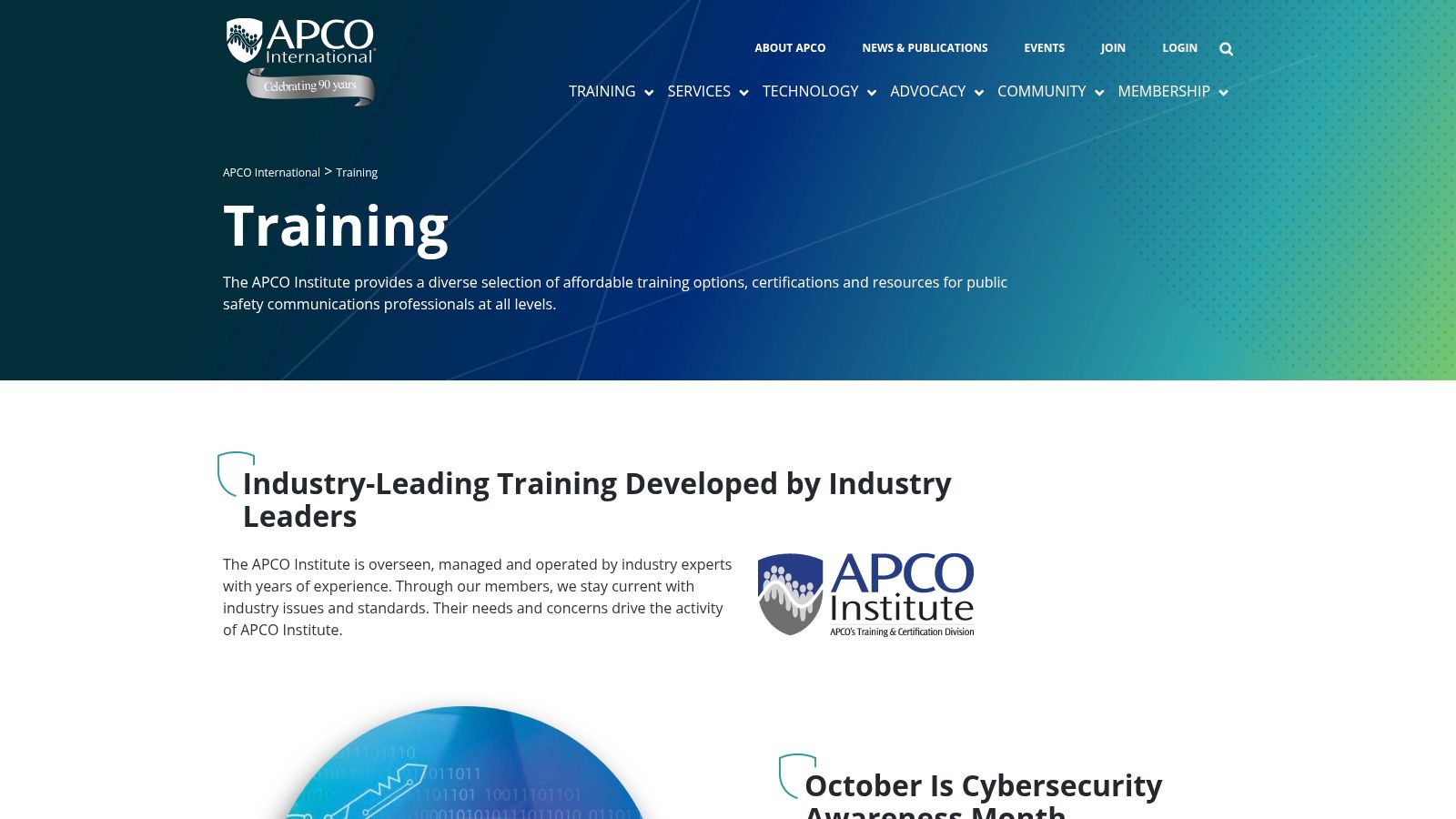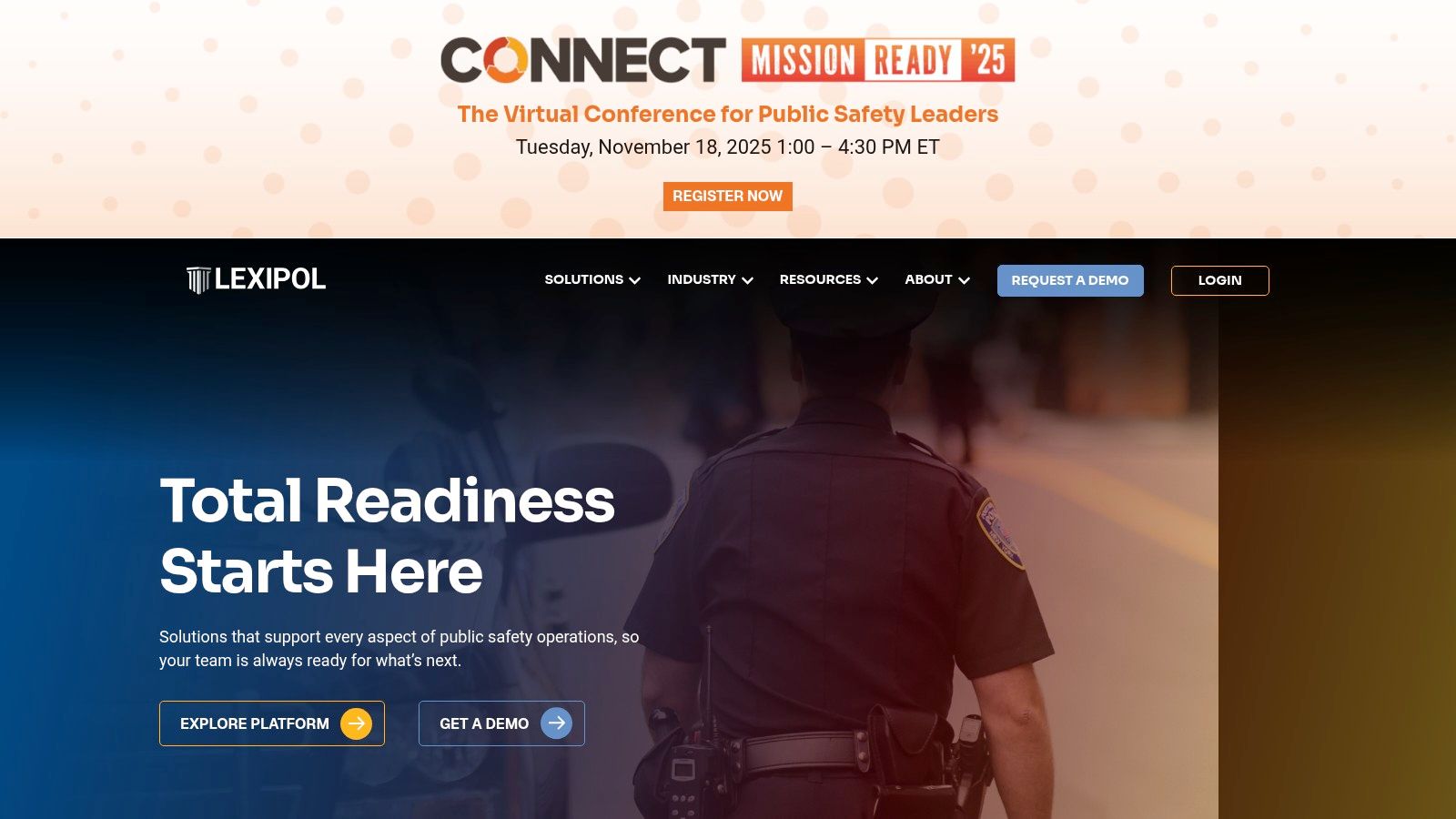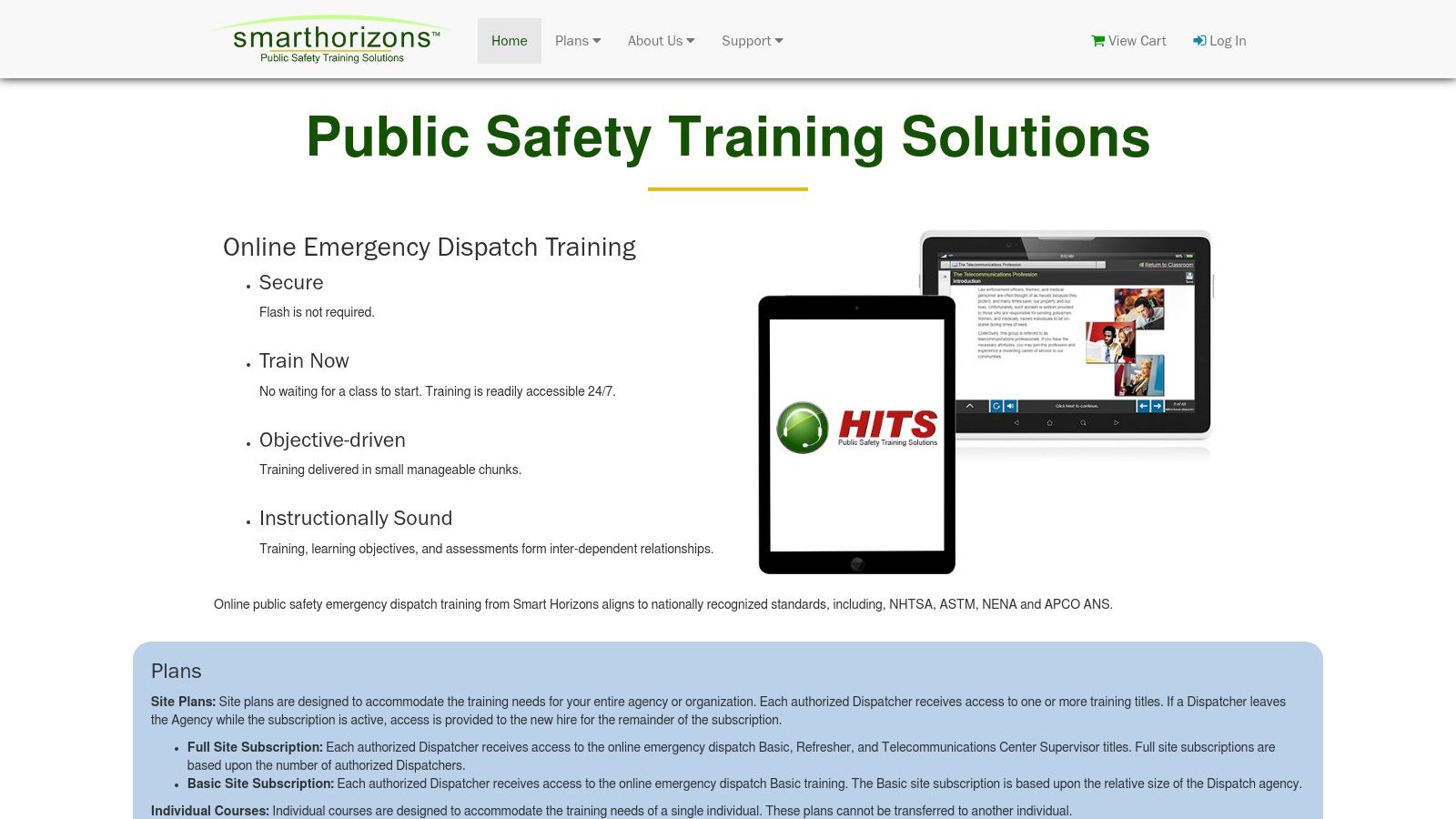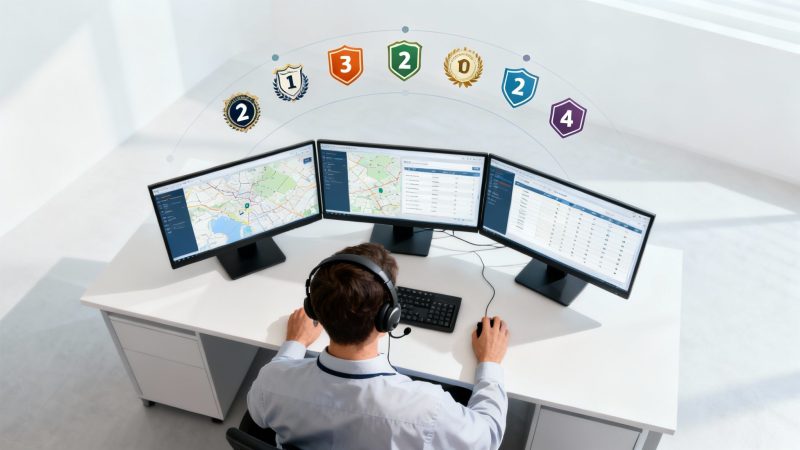Top 7 Dispatch Training Courses in 2025 to Boost Your Career
Choosing the right training is the most critical first step in a public safety dispatch career. With agency budgets tightening and performance standards rising, selecting a program that delivers recognized, high-quality certification without breaking the bank is essential. This guide is designed to help you navigate the complex landscape of dispatch training courses by providing a direct comparison of the industry's leading options.
We move beyond generic descriptions to offer practical, actionable insights. You'll learn how each program's structure can directly impact your agency's bottom line, from leveraging site licenses for cost-effective team training to choosing online formats that eliminate expensive travel and overtime costs. Our roundup details the specific certifications, costs, formats, and ideal candidates for top providers like APCO International, NENA, and IAED.
Each entry includes screenshots and direct links, making it easy to compare and select the best fit for your specific needs, whether you're an individual aspiring dispatcher or an agency director training an entire team. Get ready to find the perfect course that aligns with your career goals, meets your operational requirements, and delivers a tangible return on your training investment. This article provides a clear roadmap to help you make an informed decision quickly and efficiently.
1. APCO International (APCO Institute): The Industry Standard Setter
For aspiring or current dispatchers seeking nationally recognized credentials, APCO International is often the first and last stop. As a leading professional organization for public safety communications, its training arm, the APCO Institute, sets the benchmark that many US agencies follow. Their curriculum is comprehensive, covering everything from the foundational Public Safety Telecommunicator (PST) course to advanced certifications in fire service communications, law enforcement dispatch, and emergency medical dispatch (EMD).

What makes APCO stand out is its deep alignment with national standards and its structured career pathways. Completing their courses provides certifications that are not just pieces of paper; they are widely accepted credentials that can open doors at agencies across the country. Their EMD program, for example, is aligned with NHTSA standards and offers customizable guidecards, a crucial feature for agencies looking to integrate training with their specific operational software. Many modern dispatch platforms are designed for seamless integration with these standards; you can discover more about advanced dispatch software features to see how this works in practice.
Actionable Insights and Course Details
APCO offers its dispatch training courses in multiple formats to suit different needs and budgets. You can find in-person classes hosted by agencies nationwide, live virtual sessions that blend instructor interaction with remote learning, or fully self-paced online modules.
- Practical Example: A rural public safety answering point (PSAP) needs to certify three new hires but lacks the budget to send them to an in-person training event several states away. They can enroll the new hires in APCO's live virtual PST course, providing them with the same certified instruction at a fraction of the travel and accommodation cost.
- Money-Saving Tip: Agencies can become APCO Agency Training Program Certified. This involves having an in-house instructor certified by APCO to teach the curriculum. While there is an upfront cost for the instructor course and materials, this approach significantly reduces the long-term, per-employee training expense, especially for larger departments with consistent hiring needs.
Pricing is not always listed publicly, as it often depends on the hosting agency for in-person classes. The best approach is to create a free account on their website to view specific course schedules and costs in your area. While this extra step can be a minor inconvenience, the value of an APCO certification in the public safety field is undeniable.
Website: https://www.apcointl.org/training/
2. NENA (National Emergency Number Association): The 9-1-1 Career Development Leader
While APCO sets a broad standard, the National Emergency Number Association (NENA) excels in providing career development and advanced training for 9-1-1 professionals. NENA is the go-to resource for dispatchers looking to move beyond foundational skills into specialized areas like quality assurance, tactical dispatch, and policy development. Their curriculum is designed not just to certify but to cultivate expertise and leadership within the emergency communications center.
What truly sets NENA apart is its focus on continuous professional growth. Their courses are widely recognized for earning Emergency Number Professional (ENP) recertification points, making them invaluable for seasoned professionals maintaining their credentials. The Excellence in Dispatch (EID) certificate pathway offers a structured program that combines multiple courses, creating a clear roadmap for dispatchers aiming for supervisory or management roles. This focus on advanced topics makes NENA an essential partner for agencies dedicated to investing in their team's long-term careers.
Actionable Insights and Course Details
NENA primarily delivers its dispatch training courses through its NENA+ platform, offering Instructor-Led Online (ILO) classes with fixed durations and capped enrollment. This format ensures direct interaction with expert instructors while providing the convenience of remote learning.
- Practical Example: An experienced dispatcher wants to transition into a Quality Assurance role within their agency. They can enroll in NENA's "9-1-1 Center Quality Assurance" course online. By completing this specialized training, they gain the specific knowledge needed for the new role and earn ENP points, demonstrating a commitment to professional development that strengthens their promotion application.
- Money-Saving Tip: NENA offers significant discounts on its ILO courses for members. For an individual or agency planning to take multiple courses, the cost of a NENA membership is quickly offset by the savings. For instance, a typical course priced at $220 for non-members is just $160 for members, a savings of $60 per class. For a team of five taking just one course each, the membership pays for itself immediately.
Pricing for ILO courses is transparently listed on the website, removing any guesswork. While the fixed schedules and limited seats for online courses require advance planning, the depth of knowledge and career-specific focus provided by NENA is a critical asset for any serious 9-1-1 professional.
Website: https://www.nena.org/page/Courses
3. International Academies of Emergency Dispatch (IAED) / Priority Dispatch: Protocol-Driven Excellence
Where APCO sets the broad standard for telecommunicators, the International Academies of Emergency Dispatch (IAED) provides the gold standard for protocol-based dispatch systems. IAED, through its course portal Priority Dispatch, is the home of the globally recognized Medical Priority Dispatch System (MPDS), Fire Priority Dispatch System (FPDS), and Police Priority Dispatch System (PPDS). Agencies that adopt these structured protocols turn to IAED for their certification needs, ensuring every dispatcher is trained to provide consistent, life-saving instructions.
What makes IAED unique is its holistic ecosystem. Certification is not just a one-time class; it's an entry point into a system of continuous quality improvement, software integration, and recertification. The protocols are scientifically validated and legally defensible, offering a structured framework that reduces dispatcher discretion and improves outcomes. This deep integration is why many public safety agencies rely on IAED's training to power their call-taking processes, and it's compatible with many modern dispatcher mobile apps that streamline field communication.
Actionable Insights and Course Details
IAED’s dispatch training courses are primarily offered through in-person or live virtual classes hosted by certified agencies and instructors across the country. The Priority Dispatch portal serves as the central hub for finding and enrolling in courses like Emergency Telecommunicator Course (ETC), Emergency Medical Dispatcher (EMD), and others.
- Practical Example: A mid-sized regional PSAP decides to adopt the MPDS protocol to standardize its medical call-taking. Instead of developing their own training, the agency contacts a certified IAED instructor to host a 3-day EMD certification course on-site for its entire team. This ensures every dispatcher receives identical, protocol-specific training directly from the source.
- Money-Saving Tip: For agencies already using IAED protocols, investing in the Quality Assurance (QA) program and software like AQUA can provide significant long-term savings. By proactively identifying training gaps and improving compliance, agencies can reduce liability, improve patient outcomes, and avoid the high costs associated with critical incidents and potential litigation. Efficient QA turns training from a recurring expense into a strategic risk management tool.
Course fees typically range from $350 to $425 for hosted classes but can vary. To register, users must create an account on the Priority Dispatch portal, which allows them to search for courses by location and date. While the protocol-specific nature means it's not a universal starting point for all, for agencies committed to the Priority Dispatch System, its training is indispensable.
Website: https://courses.prioritydispatch.net/
4. Total Response (formerly PowerPhone)
For agencies looking to tightly integrate their training curriculum with their call-handling software, Total Response (formerly PowerPhone) presents a unique, all-in-one solution. The company offers specialized certification and continuing education courses for law enforcement, fire, and emergency medical dispatch. Their model is built around a unified ecosystem, where the training content directly supports and enhances the workflow within their Total Response call-handling platform.
What sets Total Response apart is its site-licensed, agency-centric approach. Instead of paying per-seat for individual courses, agencies can purchase a site license that provides unlimited access to the entire training portal for all their staff. This is ideal for centers that want a predictable, flat-rate training budget and the flexibility to onboard new hires or provide continuing education on demand without incurring additional costs per employee. The self-paced nature of the online modules makes it a powerful tool for maintaining agency-wide compliance and skill consistency.
Actionable Insights and Course Details
Total Response’s dispatch training courses are primarily delivered through a dedicated online education portal, designed for easy access and management by agency administrators. This structure is particularly beneficial for continuous professional development and certification maintenance.
- Practical Example: A mid-sized regional dispatch center with 25 telecommunicators needs to provide annual continuing education hours to maintain state certifications. By adopting the Total Response platform and its site-licensed training, they can grant every dispatcher access to a library of relevant courses. Staff can complete modules during downtime or designated training periods at their own pace, and supervisors can easily track progress through the admin portal.
- Money-Saving Tip: The greatest financial advantage comes from leveraging the site-license model to its fullest. For an agency that anticipates high staff turnover or plans to expand, this model eliminates the escalating costs of training new hires individually. The one-time annual fee covers unlimited users, turning a variable training expense into a fixed, budget-friendly operational cost.
Pricing is not publicly listed and is provided via a custom quote, as it is tailored to the agency's size and needs. This model is best suited for organizations purchasing the system as a whole, rather than for individuals seeking one-off certifications.
Website: https://www.totalresponse.com/
5. Lexipol – Dispatch1 Academy: On-Demand Continuing Education
For agencies focused on continuous professional development beyond initial certification, Lexipol’s Dispatch1 Academy offers a robust solution. Instead of being a one-time certification provider, Dispatch1 Academy is an online training library specifically designed for the ongoing educational needs of 9-1-1 dispatchers and public safety telecommunicators. Its curriculum is built for self-directed learning, covering critical topics like advanced call-handling skills, critical incident response, professional wellness, and stress mitigation.

What sets Lexipol apart is its integration into a broader public safety ecosystem used by thousands of agencies across the US. This platform is not just about ticking a training box; it’s about providing relevant, on-demand modules that telecommunicators can access anytime to sharpen their skills or meet continuing dispatch education (CDE) requirements. The focus on dispatcher wellness is particularly notable, offering vital resources to help manage the high-stress nature of the job. Many agencies find that this kind of supplemental training pairs well with the operational tools they use daily; getting the right technical support is key to making sure all systems work together smoothly.
Actionable Insights and Course Details
Dispatch1 Academy’s strength lies in its on-demand, self-paced online modules. This format is ideal for agencies needing a flexible and scalable way to provide ongoing dispatch training courses without the logistical challenges of scheduling in-person sessions.
- Practical Example: A mid-sized dispatch center identifies a recurring issue with handling high-stress calls related to domestic disturbances. The center supervisor can assign specific Dispatch1 Academy modules on active listening and de-escalation techniques to the entire team. Staff can complete the training during downtime on their shifts, immediately applying the new skills without disrupting 24/7 operations.
- Money-Saving Tip: Instead of paying for individual courses or sending staff to external workshops for CDE credits, an agency can subscribe to the entire Dispatch1 Academy library. This subscription model provides unlimited access to all courses for all employees, often resulting in a much lower per-employee, per-hour training cost compared to a-la-carte options. Bundling this with other Lexipol services, like policy management, can lead to even greater savings.
Pricing is typically provided on a quote basis for agencies, as it's designed as an organizational-level subscription rather than an individual purchase. Access requires an account set up through your agency's Lexipol subscription, ensuring a seamless and secure user experience for personnel.
Website: https://www.dispatch1academy.com/
6. Smart Horizons – Public Safety Training Solutions (PSTS)
For agencies and individuals seeking a straightforward, fully online, and budget-friendly training solution, Smart Horizons Public Safety Training Solutions (PSTS) is a standout choice. This IACET-accredited provider specializes in self-paced courses that deliver foundational knowledge with transparent pricing and easy access, making it ideal for smaller agencies, new hires needing pre-academy training, or dispatchers looking for continuing education credits. Their curriculum is designed to meet established industry guidelines from organizations like APCO and NENA.

What makes Smart Horizons different is its simplicity and clarity. Unlike many providers that require quotes or agency-level contacts, Smart Horizons lists its prices publicly for individual and agency plans. Their core offerings, the 24-hour Basic Dispatcher course and the 30-hour Emergency Medical Dispatcher course, are built on national curricula. Upon completion, users receive electronic certificates and documented Continuing Education Units (CEUs), simplifying compliance and record-keeping for both the dispatcher and their agency.
Actionable Insights and Course Details
Smart Horizons provides its dispatch training courses through a subscription model, offering 365-day access to the material. This self-paced format allows learners to complete training around their work schedules without the need for travel or time away from the center.
- Practical Example: A small volunteer fire department needs to cross-train two administrative staff members for basic dispatch duties but can't afford a week-long, in-person class. They can purchase two individual licenses for the Basic Dispatcher course from Smart Horizons. The staff members can complete the 24 hours of training online over several weeks, gaining essential skills without disrupting department operations.
- Money-Saving Tip: For agencies with even a small, consistent training need, the agency site plans offer significant cost savings. Instead of paying a per-person fee that can exceed $200 each, an agency can purchase a site plan for a flat annual fee. This gives them unlimited access to train as many dispatchers as needed throughout the year, dramatically lowering the average cost per trainee.
While Smart Horizons provides excellent foundational and EMD knowledge, it's important to note they are not a protocol vendor like IAED or APCO. Agencies using specific EMD protocol systems will still need to pursue vendor-specific certifications. However, for building core competencies affordably and conveniently, Smart Horizons is an excellent and accessible resource.
Website: https://www.smarthorizons.org/psts/
7. The Public Safety Group (PSG)
The Public Safety Group (PSG) offers a flexible and specialized approach to dispatcher training, catering to agencies that need both foundational education and targeted, in-service professional development. While they provide a comprehensive 40-hour Basic Telecommunicator course, their real strength lies in the diverse catalog of specialty seminars. These courses cover critical, modern topics like active assailant incidents, managing high-risk calls, and understanding legal liability in the communications center.
What makes PSG a valuable resource is its blend of delivery formats designed for working professionals. They offer everything from half-day seminars to multi-week online courses, allowing agencies to provide crucial refresher training without taking key personnel offline for extended periods. This model is ideal for agencies looking to enhance their team's skills in specific areas or fulfill continuing education requirements with relevant, high-impact content.
Actionable Insights and Course Details
PSG’s dispatch training courses are structured to be accessible, offering on-site classes, live seminars at various locations, and multi-week online sessions that fit around a dispatcher's demanding schedule. This flexibility makes them a go-to for continuous professional education.
- Practical Example: A mid-sized dispatch center identifies a training gap in handling active shooter calls after a regional incident. Instead of developing a curriculum from scratch, the center’s training coordinator contracts PSG to deliver their specialized "Active Assailant Incidents for 9-1-1" seminar on-site. This provides the entire team with expert-led, consistent training in a single day, ensuring everyone is on the same page for a critical incident type.
- Money-Saving Tip: Agencies can save significantly by hosting a PSG seminar. By providing the venue, the host agency often gets a set number of free seats in the training. They can then open registration to neighboring departments, generating goodwill and potentially offsetting their own costs while bringing valuable training directly to their region, eliminating travel expenses for their staff.
Course pricing is typically listed per event and can vary based on the host and location. To get the most accurate information, you will often need to check the specific course page or contact PSG directly. While this requires a bit of proactive research, the targeted nature of their training catalog offers exceptional value for addressing specific operational needs.
Website: https://www.publicsafetygroup.com/training-and-seminars
7-Provider Dispatch Training Comparison
| Provider | 🔄 Implementation complexity | ⚡ Resource requirements | ⭐ Expected outcomes | 📊 Ideal use cases | 💡 Key advantages |
|---|---|---|---|---|---|
| APCO International (APCO Institute) | Moderate — structured courses and instructor pathways; some registration steps | Variable pricing by course/host; instructor/admin resources for delivery | ⭐⭐⭐⭐ — Broad, standards‑aligned certifications and instructor credentials | Agencies needing comprehensive PST/EMD catalog and recognized certifications | Widely accepted; standards‑aligned; multiple delivery modes (in‑person, live virtual, online) |
| NENA (National Emergency Number Association) | Moderate — scheduled ILO classes with capped seats | Per‑class fees (transparent for members/non‑members); fixed schedules | ⭐⭐⭐ — Recognized for ENP recert points and career development | 9‑1‑1 professionals pursuing ENP recertification or advanced dispatch topics | Transparent ILO pricing; structured certificate pathway (Excellence in Dispatch) |
| IAED / Priority Dispatch | High — protocol adoption, portal enrollment, QA/analytics setup | Course fees vary by host; portal account required; QA tool integrations | ⭐⭐⭐⭐ — Gold‑standard protocol certifications with strong QA support | PSAPs requiring protocol‑based dispatch (EMD/EPD/ETC/EFD) and QA programs | Widely adopted protocols; clear cert/recert paths; QA/analytics ecosystem |
| Total Response (formerly PowerPhone) | Low–Moderate — site‑license setup and platform integration | Agency site‑license (quoted); integrated with call‑handling platform | ⭐⭐⭐ — Flexible, self‑paced CE tied to operational systems | Agencies using Total Response that want integrated training and unlimited access | Site‑license unlimited agency access; tight integration with call‑handling platform |
| Lexipol – Dispatch1 Academy | Low — on‑demand library; enrollment via agency subscription | Agency subscription/account required; pricing typically procured by agencies | ⭐⭐⭐ — Convenient on‑demand professional development and CDE support | Dispatchers needing on‑demand training (wellness, stress management, skills refreshers) | On‑demand modules within a broader Lexipol ecosystem; complements formal certs |
| Smart Horizons – PSTS | Low — fully online, self‑paced courses with clear structure | Published per‑dispatcher or agency plans; clear pricing and CEU docs | ⭐⭐⭐ — Meets APCO/NENA minima; provides CEUs and completion certs | Small agencies, new hires, or teams needing published pricing and CEUs | IACET‑accredited; published pricing; CEU documentation and certificates |
| The Public Safety Group (PSG) | Moderate — mix of seminars, multi‑week online, and onsite delivery | Per‑event pricing (varies); contact/host registration for details | ⭐⭐⭐ — Effective for refreshers and specialty topics | Agencies seeking specialty seminars (active assailant, liability) or scheduled refreshers | Flexible delivery formats; focused specialty topic coverage |
Making the Smart Choice for Your Dispatch Team
Selecting the right dispatch training course is a critical investment that directly influences your team's performance, confidence, and operational efficiency. The options we've explored, from APCO International's foundational certifications to the protocol-driven systems of IAED, offer distinct pathways to excellence. Your final decision should not just be about a single course, but about building a comprehensive training strategy that aligns with your agency’s specific operational realities, budget constraints, and long-term goals.
Matching Training to Your Agency’s Needs
The key takeaway from this roundup is that there is no one-size-fits-all solution. A large, multi-jurisdictional 9-1-1 center will have different requirements than a private security firm or a volunteer fire department. To make the most strategic choice, consider these scenarios:
- For Foundational Certification and Industry Recognition: If your goal is to ensure all new hires meet a nationally recognized standard, APCO and NENA are unparalleled. Their courses provide the essential building blocks for a successful career in public safety telecommunications.
- For Strict Protocol Adherence: Agencies focused on minimizing liability and standardizing emergency responses will find the structured, evidence-based protocols from IAED (Priority Dispatch) to be the most effective solution.
- For Comprehensive Skill Development: If you want to move beyond basic call-taking to empower dispatchers with advanced critical thinking and incident management skills, Total Response offers a holistic curriculum designed to handle the full spectrum of emergencies.
- For Flexible, Continuous Learning: To combat skill fade and provide ongoing professional development without pulling staff off the floor for extended periods, Lexipol’s Dispatch1 Academy and Smart Horizons offer invaluable on-demand, bite-sized training modules.
A Practical Approach to Implementation and Cost Savings
Choosing the best dispatch training courses involves more than just curriculum; it requires a smart financial strategy. To maximize your return on investment, focus on cost-efficiency. For instance, an agency training ten new dispatchers a year might save thousands by opting for a site license from a provider like Total Response instead of paying per-seat for each employee. Similarly, leveraging the member discounts offered by organizations like NENA and APCO can significantly reduce the overall training budget.
A powerful, money-saving tactic is to blend different training types. Use a comprehensive in-person or virtual course for initial certification, then supplement it with a subscription to an online platform like Dispatch1 Academy for ongoing, targeted refreshers. This hybrid model ensures your team remains sharp and compliant without the recurring high costs of sending them to off-site classes annually. This approach directly translates into a more competent team and a healthier budget. Ultimately, a well-trained dispatcher is an agency’s greatest asset, capable of de-escalating crises, providing life-saving instructions, and ensuring responder safety. This investment pays dividends in every call they handle.
Once your team is trained to the highest standard, you need a system that supports their skills. Resgrid, LLC provides a powerful, affordable dispatch and team management platform that integrates seamlessly with your operations, helping you manage calls, personnel, and resources with unparalleled efficiency. Discover how you can amplify the impact of your training investment by visiting Resgrid, LLC today.

